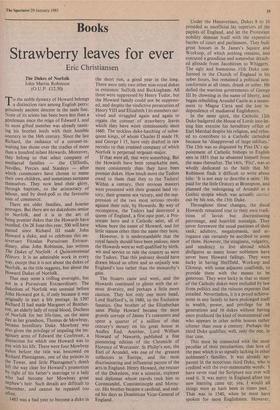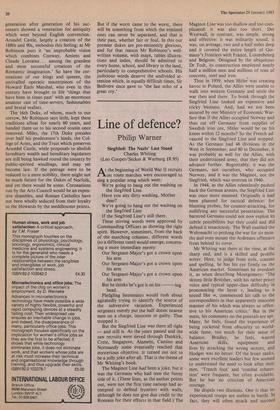Books
Strawberry leaves for ever
Eric Christiansen
The Dukes of Norfolk John Martin Robinson (O. U . P. £12.50)
To the noble dynasty of Howard belongs a distinction rare among English'peers: genuinely ancient descent in the male line. None of its scions has been born less than a gentleman since the reign of Edward I, and its most gifted member was already taunt- ing his brother lords with their humble ancestry in the 16th century. Since the last Richard, the radiance of a coronet-in- waiting has shone over the cradles of more than a hundred infant Howards. Moreover, they belong to that select company of mediaeval families — the Cliffords, Nevilles, Percies and Stanleys — after which commoners have chosen to name their own children, and sometimes surname themselves. They now lend their glory, through baptism, to the aristocracy of labour, and by deed-poll to the favourite sons of commerce.
There are older families, and hoarier Peerages. But there are no dukedoms senior 10 Norfolk, and it is in the art of being premier dukes that the Howards have excelled. On 28 June this year, 500 will have passed since Richard III made John Howard a duke, and to celebrate this an- niversary Fitzalan Pursuivant Extraor- dinary, alias John Robinson, has written The Dukes of Norfolk: A Quincentennial History. It is an admirable work in every Way, except that it is not about the dukes of Norfolk, as the title suggests, but about the Howard Dukes of Norfolk.
That may seem a trifling oversight, but not in a Pursuivant Extraordinary. The dukedom of Norfolk was unusual before John Howard got it, if only because it was originally in part a life peerage. In 1397 Richard 11 had made Margaret of Brother- ton, an elderly lady of royal blood, Duchess of Norfolk for her life-time, on the same clay as her grandson, Thomas de Mowbray, became hereditary Duke. Mowbray was also given the privilege of impaling the im- aginary arms of Edward the Confessor, a distinction for which one Howard was to Pay with his life. There were four. Mowbray dukes before the title was bestowed on Richard Plantagenet, one of the princes in the Tower, and little Plantagenet's death left the way clear for Howard's promotion by right of his father's marriage to a lady who had become her Mowbray great nephew's heir. Such details are difficult to remember, and cannot be repeated too often.
1483 was a bad year to become a duke in the short run, a good year in the long. There were only two other non-royal dukes in existence: Suffolk and Buckingham. All three were suppressed by Henry Tudor, but the Howard family could not be suppress- ed, and despite the vindictive persecution of Henry VIII and Elizabeth I its members sur- vived and struggled again and again to regain the coronet of strawberry leaves which they have worn continuously since 1660. The reckless duke-hatching of subse- quent kings, of whom Charles II made 19, and George I 15, have only drafted in raw recruits to that ermined company of which Norfolk is perpetual sergeant-major.
If that were all, that were something. But the Howards have been remarkable men, more consistently than they have been premier dukes. How much more the Tudors owed to them than they to the Tudors! Within a century, their envious masters were presented with their greatest land vic- tory, their greatest sea victory, and the sup- pression of the two most serious revolts against their rule, by Howards. By way of recompense, the Tudors had destroyed a queen of England, a first-rate poet, a Pro- testant hero and a Catholic saint, all of whom bore the name of Howard, and for little reason other than the name they bore.
However, it is understandable that the royal family should have been jealous, since the Howards were as well qualified by birth, wit and service to rule the country as were the Tudors. That this jealousy should have drawn blood so often and so unjustly was England's loss rather than the monarchy's gain.
The Stuarts came and went, and the Howards continued to glitter with the ut- most diversity, and perhaps a little more caution. They lost only one more head, Lord Stafford's, in 1680, to the Exclusion fanatics. One brother of the Elizabethan saint Philip Howard became the most grossly corrupt of James l's treasurers and spent a quarter of a million of that century's money on his great house at Audley End. Another, Lord William Howard of Naworth, published a fine pioneering edition of the Chronicle of Florence of Worcester. St Philip's son, the Earl of Arundel, was one of the greatest collectors in ' Europe, and the most discriminating and influential patron of the arts in England. Henry Howard, the rescuer of the Dukedom, was a scientist, explorer and diplomat whose travels took him to Coromandel, Constantinople and Moroc- co. His brother became a cardinal, and end- ed his days as Dominican Vicar-General of England.
Under the Hanoverians, Dukes 8 to 10 presided as unofficial lay superiors of the papists of England, and let the Protestant nobility demean itself with the expensive battles of court and parliament. They built great houses in St James's Square and Worksop, of which nothing remains, and executed a grandiose and somewhat detach- ed glissade from Jacobitism to Whiggery. The ugly and humorous 1 1 th Duke con- formed to the Church of England in his sober hours, but remained a political non- conformist at all times, drunk or sober. He defied the wartime governments of George III by clowning in the name of liberty, and began rebuilding Arundel Castle as a monu- ment to Magna Carta and the lost in- dependence of mediaeval Englishmen.
In the same spirit, the Catholic 12th Duke badgered the House of Lords into let- ting him exercise his hereditary office of Earl Marshal despite his religion, and refus- ed to contribute to a Catholic cathedral because he 'disapproved of large edifices.' The 13th was so disgusted by Pius IX's ap- pointment of Catholic bishops to English sees in 1851 that he absented himself from the mass thereafter. The 14th, 'Fitz', was so wholly dedicated to the faith that Mr Robinson finds it difficult to write about him: 'It is not easy to describe a saint.' He paid for the little Oratory at Brompton, and planned the redesigning of Arundel as a Gothic utopia which was actually carried out by his son, the 15th Duke.
Throughout these changes, the ducal Howards remained true to their own tradi- tions of lavish but discriminating patronage, and heartfelt nostalgia. They never foreswore the usual pastimes of their rank; adultery, megalomania, and ar- rogance can certainly be ascribed to some of them. However, the stinginess, vulgarity, and tendency to live abroad which disfigures so many lesser noblemen have never been Howard failings. They were lucky in having Sheffield, Worksop and Glossop, with some adjacent coalfields, to provide them with the means to be generous. They were lucky in that so many of the Catholic dukes were excluded by law from politics and the ruinous expenses that entailed. Nevertheless, it is a proud achieve- ment in any family to have prolonged itself in wealth, power, and privilege for 16 generations and 16 dukes without having once produced the kind of monumental cad who appears in other noble houses rather oftener than once a century. Perhaps the third Duke qualifies; well, only the one, in that case.
This must be connected with the most peculiar of their peculiarities; that love of the past which is so signally lacking in other noblemen's families. It was already ap- parent in the notorious third Duke, who is credited with the ever-memorable words: 'I have never read the Scripture nor ever will read it. It was merry in England afore the new learning came up; yea, I would all things were as hath been in times past.' That was in 1540, when he must have spoken for most Englishmen. However,
generation after generation of his suc- cessors showed a veneration for antiquity which went beyond English convention. Arundel Castle, largely a creation of the 1880s and 90s, embodies this feeling; as Mr Robinson puts it 'an improbable vision which combines Conway, Amiens and Claude Lorraine... among the grandest and most successful creations of the Romantic imagination.' So have the cor- onations of our kings and queens, the unrivalled operatic masterpieces of the Howard Earls Marshal, who even in this century have brought to life 'things that have been in times past' with an enormous amateur cast of time-servers, fashionables and brutal realists.
The 16th Duke, of whom, much to our sorrow, Mr Robinson says little, kept these traditions afloat for nearly 60 years, and handed them on to his second cousin once removed. Miles, the 17th Duke presides over half his predecessor's lands, the Col- lege of Arms, and the Trust which preserves Arundel Castle, while proposals to abolish hereditary wealth and hereditary legislators are still being hawked round the country by public-spirited windbags, and may yet become law. If the peerage were to be reduced to a mere nobility, there might not be much future for the Dukes of Norfolk, and yet there would be some. Coronations run by the Arts Council would be an expen- sive shambles, and Roman Catholics have not been wholly seduced from their loyalty to the Howards by the meddlesome priests. But if the worst came to the worst, there will be something from which the ermined ones can never be separated, and that is their past, whether fair or foul. In this our premier dukes are pre-eminently glorious, and for that reason Mr Robinson's well- written volume, with maps, tables illustra- tions and index, should be admitted to every home, school, and library in the land, particularly to comprehensive schools. His judicious words deserve the undivided at- tention which, in equally difficult times, Sir Bedivere once gave to 'the last echo of a great cry.'







































 Previous page
Previous page